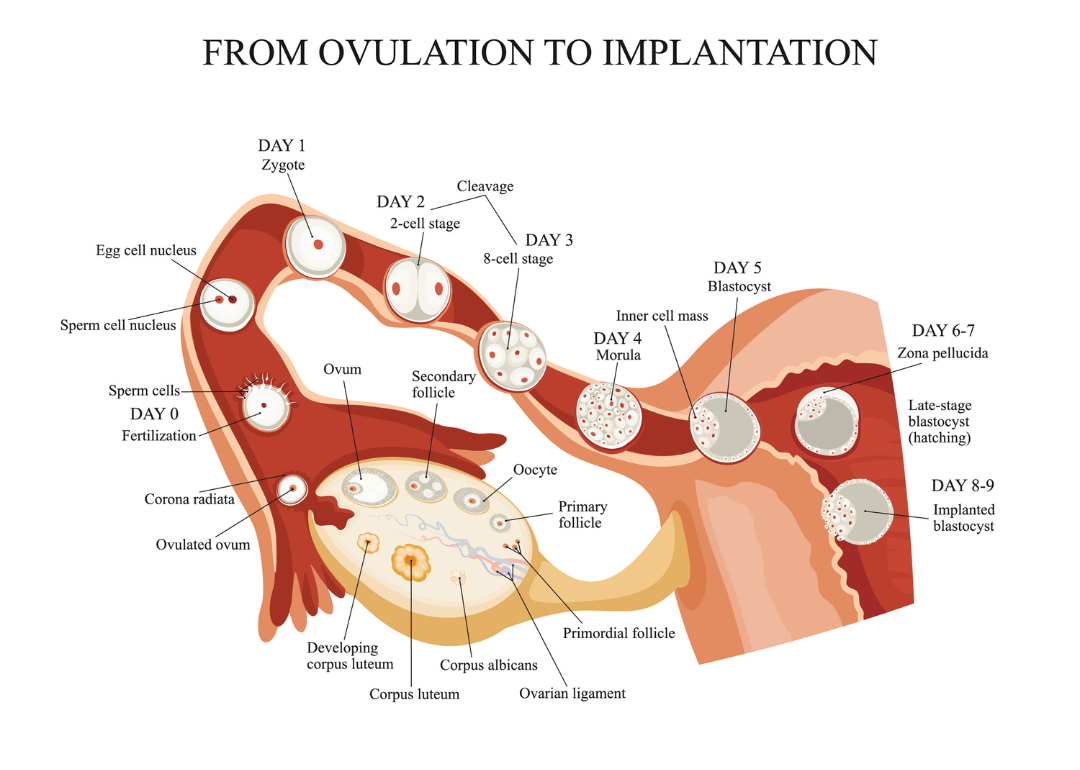Everything you need to know about when and how implantation occurs at the beginning of pregnancy

Canva
Everything you need to know about when and how implantation occurs at the beginning of pregnancy
A young Black couple sits on a couch smiling, as the man lays his hand on the pregnant belly of his partner
If you’re thinking about pregnancy, you’ve probably come across the term implantation in your Googling. You may have heard folks mention implantation cramping or implantation bleeding, but maybe you haven’t felt anything yet. Early pregnancy can be really confusing, especially when you may not even know for sure whether you’re pregnant yet or not. So what is implantation and when does it take place? Babylist breaks down everything you need to know about implantation.
What is implantation?
Though you won’t really know you’re pregnant until you see those two pink lines, your body has been hard at work from the moment conception occurred. There’s a lot going on behind the scenes, and it all starts with implantation.
“Implantation is the beginning of the development of the placenta and embryo as the fertilized egg burrows into the thickened lining of the uterus to establish a blood supply to both,” ob-gyn Dr. Kim Langdon explains.
Although the egg may have been fertilized over a week before, it’s only after implantation that your body starts producing hCG—human chorionic gonadotropin, also known as the hormone that’s picked up by pregnancy tests.
![]()

logika600 / Shutterstock
When does implantation occur?
From ovulation to implantation.Fertilization, zygote, cleavage, morula, blastocyst.
Sperm meets egg, and about nine months later, you have a baby. Sounds simple, right? Let’s back things up a bit, Biology 101 diagram-style.
Your ovary will release an egg into your fallopian tube, and ideally, sperm will be waiting in your fallopian tube. If fertilization is successful (yay!), the egg will begin to divide and travel down your tube toward your uterus. This process usually takes about a week; after that, implantation happens.
“[Implantation] usually occurs about 5 days after fertilization,” explains Dr. Langdon, but of course, every body is different. On average, implantation occurs about 8-10 days after ovulation, but it can happen as early as six and as late as 12. This means that for some women, implantation can occur around cycle day 20, while for others, it can be as late as day 26. This is part of the reason why counting your pregnancy weeks can be confusing.
How long does implantation last?
Although most pregnancies are 40 weeks, the process of implantation represents only a fraction of that time. Implantation typically lasts only a few days.
Once it’s complete and the fertilized egg—now called an embryo—is burrowed snugly inside your uterine wall, it will begin to produce hCG. Your body’s progesterone levels will also begin to rise, nourishing your uterine lining and preventing your period from beginning.
When to take a pregnancy test
Congratulations are in order, because now you’re officially pregnant! But don’t start peeing on a stick quite yet.
At the very earliest, the most sensitive of pregnancy tests will begin to show a positive result around 10 days past ovulation. Remember—ovulation, fertilization, and implantation all work together in a perfect storm to result in a viable pregnancy. Each process has its own timeline, and each timeline differs for every body, so what’s the norm for one pregnant person may be different for another.
Even after an embryo successfully implants and begins producing hCG, it still takes a few days for the hormone to build to a high enough level to be detected by a pregnancy test.
Bottom line: save yourself time and money (not to mention nerves!) and do your best to wait until the first day of your missed period to take a home pregnancy test in order to get an accurate reading.
What does implantation feel like?
There are a lot of misconceptions about whether or not someone can actually feel implantation, so let’s set the record straight.
For most people, implantation feels like nothing, though some report feeling a few symptoms.
“Implantation can lead to cramping, spotting, and abdominal pain,” Dr. Langdon told Babylist. But some people may not notice any symptoms of implantation at all. Do your best to stay cool, calm, and collected during that two-week wait—just because you’re not feeling any implantation symptoms doesn’t mean it’s not happening.
Implantation symptoms
Since there’s no real correlation between when implantation happens and actual implantation symptoms, it’s best to think instead about implantation symptoms and how they relate to early pregnancy.
The most common implantation symptoms of early pregnancy include:
- Implantation cramps. Some people may notice some minor cramping right around the time implantation is taking place. Though there’s no way to know for sure what’s actually going on, what we do know is that this cramping is due to the rise in progesterone that occurs during the second half of your cycle, whether you’re pregnant or not.
- Implantation bleeding. “Implantation bleeding is thought to be light bleeding that occurs about 10 days after ovulation,” says Washington, D.C.-based ob-gyn Dr. Cordelia Nwankwo. This type of bleeding isn’t heavy enough to even fill a panty liner, stops on its own, and doesn’t require treatment. It’s experienced by about a third of all pregnant women, though keep in mind that “there are no studies that actually confirm early bleeding as being caused by implantation,” says Nwankwo.
- Nausea. Often some of the first tip-offs that something might be up, nausea, and vomiting are popular—and unpleasant—symptoms in early pregnancy. You may also start noticing changes in your appetite or that you’re suddenly getting grossed out by foods you previously loved.
- Tender breasts. As your hormones change, you may start to notice your breasts starting to swell and feel a lot more sensitive than usual. This also happens to many people before they start their period.
- Constipation and bloating. Things feeling like they’re starting to slow down? You can thank those pregnancy hormones yet again for constipation, a common early pregnancy symptom. You may also notice you’re looking extra bloated during this time, again, due to hormones.
- Fatigue. Growing a baby is hard work! If you’re feeling more tired than usual, that’s often a symptom experienced around the time of implantation, caused by a rise in progesterone and increased blood volume.
- Headaches. Another side effect of your increased blood volume during pregnancy, headaches are a common implantation symptom.
- Mood swings. Notice yourself getting extra bothered by even the smallest of things? Mood swings are a common symptom during early pregnancy. Blame it on those hormones.
While implantation can be a bit of a mystery, a positive pregnancy test is the only way to be sure that you’re pregnant. We know it’s hard, but waiting a few days until after the day of your missed period to take it will give you a much more accurate result.
This story was produced by Babylist and reviewed and distributed by Stacker Media.